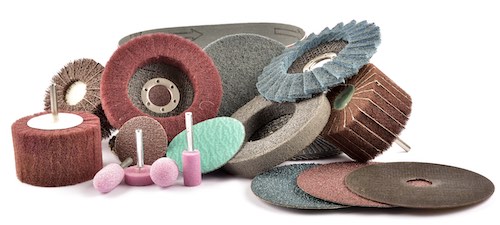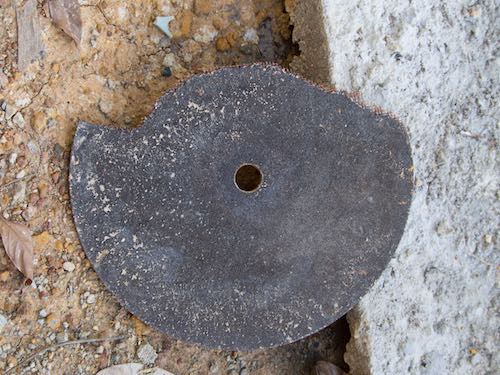This short article provides a quick overview of abrasive wheels in the workplace.

What are abrasive wheels?
Abrasive wheels are used for grinding. They vary in shape and size and are made from compounds that have been bonded together using various substances. The earliest abrasive wheels were millstones made from stone.Today, aluminium oxide is the most common abrasive material and is often used for grinding metals such as steel.How do abrasive wheels work?
Abrasive wheels are precision tools with grains on the outer circumference which effectively create thousands of cutting points as the wheel spins.
The pores are hollow spaces between abrasive grains and the bond, which help with the clearance of discarded material during the grinding process.
When the wheel is in use, the abrasive grains cut into the material that is being ground, removing the unwanted surface material in small chips.
During grinding, the cutting points on the abrasive grains are worn flat, becoming increasingly blunt. Over time abrasive wheels need replaced. If they are cracked they need replaced immediately, because they could burst during use.
They also periodically dressed. Dressing an abrasive wheel means removing the very outer surface of the wheel so a new sharp surface can be exposed. This is because over time the outer edge will blunt. Ways to dress the wheel depend on what the wheel is made of.
Different types of Abrasive Wheel
Abrasive wheels are used in two main types of machines: pedestal and portable.A pedestal grinder has a mounted wheel that sits within a pedestal. The pedestal is either bolted to the floor or sits on rubber feet. These types of grinders are often used to sharpen cutting tools and to work extremely hard materials.Portable grinders are hand-held devices, such as angle grinders. They are widely used in metalworking and construction, as well as by the emergency services.

Is abrasive wheel training required?
If you use abrasive wheels yourself for your own hobby there are no specific training requirements. In the workplace the situation is different.The use of Abrasive wheels in the workplace is covered under PUWER regulations. Employers have a legal duty to ensure (1) machinery is safe to use, that (2) operators wear appropriate protection such as general PPE and hand protection and (3) operators receive appropriate abrasive wheel training.
What are the dangers from abrasive wheels?

- Every wheel has the inherent risk of wheel burst. When a wheel bursts, debris can explode from the wheel and cause deep abrasions or even death.
- The grinding action can cause sparks, splinters and flying debris. Sparks can cause fires and burn your skin. Splinters and flying debris are particularly likely to cause eye injuries.
- The rotation of the wheel poses another risk. If your hand or finger comes into contact with the surface, there is a real danger of it being mangled or cut off.
- Not respecting all the safety controls and procedures within your workplace is another risk. These controls and procedures are there to help keep you and your colleagues safe.
- Grinding can cause dust and fumes, which can lead to coughing, sneezing and asthma attacks. Long term, you may be at risk of lung damage.
- Vibration is another hazard. The vibrating motion from both portable and pedestal machines can lead to hand arm vibration syndrome. Symptoms can range from pain in the hand and fingers, to losing fingers due to restricted blood flow.
- Finally, grinding machines produce noise. The effect of noise on hearing can be temporary or permanent. Permanent damage is more likely to be caused by prolonged exposure, but it is important to note that even a short exposure can cause long term damage.






